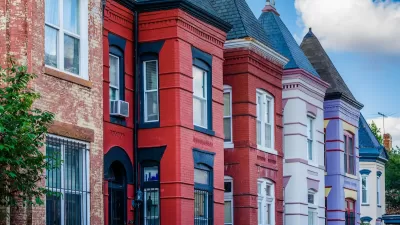Households seeking lower-cost rental housing units are not seeing housing supply go up as quickly as higher-income families after upzoning.

An Urban Institute study of zoning reforms in more than 1,000 cities found that low-income renters are the slowest to experience the benefits of zoning changes and an increased housing supply, whose units are concentrated at the higher end of the spectrum, reports Molly Bolan in Route Fifty.
“That’s not to say updating land-use regulations aren’t beneficial to households across the income spectrum, the report notes. The supply change for less expensive units is positive but isn’t significant enough to be definitively a direct result of zoning reforms.” But “By building higher-cost units, higher-income households can leave older buildings which are then available to lower-income families in a process known as ‘filtering.’”
Meanwhile, “The study also found that cities that tightened restrictions saw median rents go up in the years following implementation.”
But the impact of zoning reforms that boost construction is complex, with new developments and amenities leading to gentrification and displacement. “In these cases, more immediate initiatives, like rental assistance programs, are all the more important.” Ultimately, the researchers conclude that “there really is no silver bullet, and we have to do everything—we have to attack this problem from every angle.”
FULL STORY: Do Zoning Reforms Benefit Renters?

Planetizen Federal Action Tracker
A weekly monitor of how Trump’s orders and actions are impacting planners and planning in America.

Chicago’s Ghost Rails
Just beneath the surface of the modern city lie the remnants of its expansive early 20th-century streetcar system.

San Antonio and Austin are Fusing Into one Massive Megaregion
The region spanning the two central Texas cities is growing fast, posing challenges for local infrastructure and water supplies.

Since Zion's Shuttles Went Electric “The Smog is Gone”
Visitors to Zion National Park can enjoy the canyon via the nation’s first fully electric park shuttle system.

Trump Distributing DOT Safety Funds at 1/10 Rate of Biden
Funds for Safe Streets and other transportation safety and equity programs are being held up by administrative reviews and conflicts with the Trump administration’s priorities.

German Cities Subsidize Taxis for Women Amid Wave of Violence
Free or low-cost taxi rides can help women navigate cities more safely, but critics say the programs don't address the root causes of violence against women.
Urban Design for Planners 1: Software Tools
This six-course series explores essential urban design concepts using open source software and equips planners with the tools they need to participate fully in the urban design process.
Planning for Universal Design
Learn the tools for implementing Universal Design in planning regulations.
planning NEXT
Appalachian Highlands Housing Partners
Mpact (founded as Rail~Volution)
City of Camden Redevelopment Agency
City of Astoria
City of Portland
City of Laramie





























